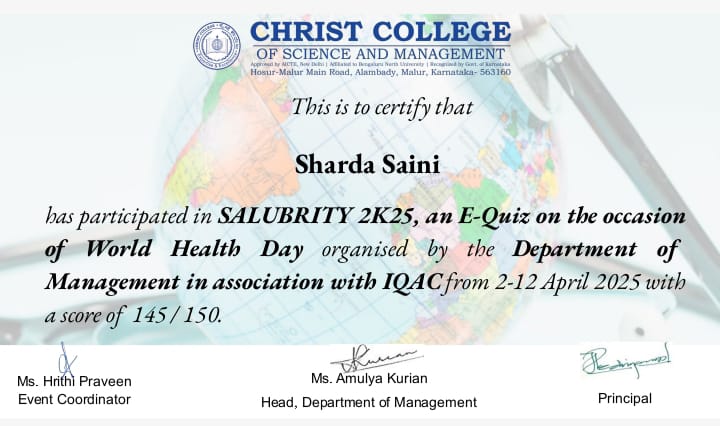
Organizer: The Department of Management, in collaboration with IQAC, Christ College of Science and Management!
Presents “Salubrity: Elevating Health, Empowering Lives”, an exciting International E-Quiz on World Health Day!
About the Quiz
- Theme: “Salubrity: Elevating Health, Empowering Lives”
- Quiz Duration: 2nd – 12th April 2025
- E-Certificates for all participants!
- Free Participants
- This quiz is open to participants worldwide, offering insights into key management concepts in the health and wellness sector and their role in achieving salubrity – the state of being healthy.
Apply Link
100% Correct Answers Here
What is the primary function of the World Health Organization (WHO)?
*
To promote world trade
To direct and coordinate international health within the United Nations system
To regulate financial markets
To manage global weather patterns
What does BMI stand for?
*
Body Muscle Index
Basic Metabolic Index
Body Mass Index
Bone Marrow Index
What is the primary role of a healthcare administrator?
*
Providing direct patient care
Managing the operations of healthcare facilities
Conducting medical research
Developing new medical treatments
What is the definition of hygiene?
*
The study of plants
Practices that maintain health and prevent disease
The study of animals
The study of stars
What are macronutrients?
*
Vitamins and minerals
Proteins, carbohydrates, and fats
Water and fiber
Artificial sweeteners
What is the recommended daily intake of sodium?
*
Less than 2300 mg
5000 mg
10000 mg
100 mg
What is ‘healthcare governance’?
*
The rules and regulations for patients
The system by which healthcare organizations are directed and controlled
The process of medical billing
The technology used in hospitals
What are ‘social determinants of health’?
*
Genetic factors
Conditions in which people are born, grow, live, work and age
Personal lifestyle choices
Availability of hospitals
What is a ‘health system’?
*
A network of hospitals
All organizations, people, and actions whose primary intent is to promote, restore, or maintain health
A government agency
A pharmaceutical company
What is a ‘pandemic’?
*
A local outbreak of a disease
A widespread epidemic affecting several countries or continents
A seasonal illness
A rare genetic disorder
What is the function of iron in the body?
*
Building strong bones
Carrying oxygen in the blood
Improving eyesight
Digesting carbohydrates
What are trans fats?
*
Healthy fats found in fish
Unhealthy fats found in processed foods
Fats found in fruits
Naturally occurring fats in dairy
What is the benefit of consuming omega-3 fatty acids?
*
Improved heart health
Increased muscle mass
Enhanced eyesight
Improved digestion
What is mental health?
*
The absence of mental illness
A state of well-being in which an individual realizes their own abilities
Only diagnosed disorders
Only related to emotion
Which activity is known to reduce stress?
*
Meditation
Exercise
Spending time in nature
All of the above
What is mindfulness?
*
Thinking about the past
Being fully present in the moment
Planning for the future
Ignoring your surroundings
What is self-care?
*
Being selfish
Taking time to do things that nourish your mind and body
Ignoring your problems
Isolating yourself
What is herd immunity?
*
Immunity to all diseases
Protection of a population when a high percentage is vaccinated
Immunity passed from mother to child
Immunity gained from having a disease
Which of the following is an example of a vector-borne disease?
*
Common cold
Malaria
Influenza (flu)
Strep throat
What is ‘telemedicine’?
*
Surgery performed remotely
Using technology to provide healthcare from a distance
A new type of medication
A method of physical therapy
What is ‘pharmacovigilance’?
*
The study of drug effectiveness
Monitoring the safety of medications after they are on the market
Developing new drugs
Regulating drug prices
What is ‘healthcare informatics’?
*
Study of alternative medicine
Use of data and technology to manage health information
Patient communication techniques
Medical equipment maintenance
What is the recommended amount of sleep for adults per night?
*
4-6 hours
7-9 hours
10-12 hours
1-3 hours
What is the function of white blood cells?
*
carry oxygen
fight infections
digest food
produce hormones
What is the role of therapy in mental health care?
*
To provide medication
To offer a safe space to talk and develop coping skills
To perform surgery
To diagnose physical illness
What are the signs of depression?
*
Persistent sadness
Loss of interest in activities
Changes in appetite or sleep
All of the above
What is the chain of infection?
*
The process of getting stronger after an infection
The sequence of events that leads to an infection
The body’s defense mechanisms against infection
The development of immunity
Who discovered the double helix structure of DNA?
*
Rosalind Franklin
James Watson and Francis Crick
Maurice Wilkins
Linus Pauling
Which leadership style is most effective in a medical emergency?
*
Democratic
Laissez-faire
Autocratic
Participative
What is the primary goal of healthcare management?
*
Maximizing profits
Providing efficient and effective healthcare services
Reducing staff salaries
Expanding hospital size